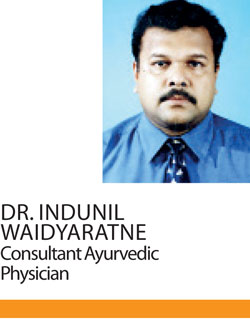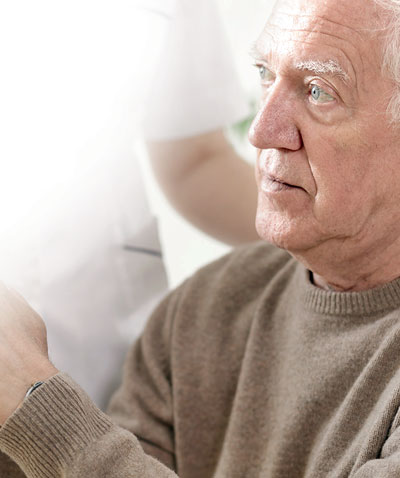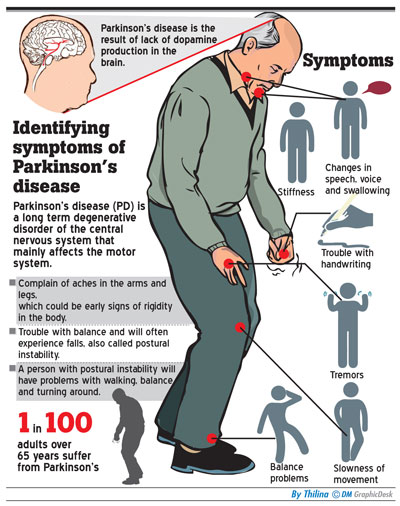Reply To:
Name - Reply Comment
Last Updated : 2024-04-25 09:17:00
 Imagine waking up one day, after a sleepless night to find out that your limbs have a mind of their own. Lifting your arm to reach for a glass of water needs some concentration and a simple effort to laugh at a joke will drain you of all energy. For those living with Parkinson’s disease, this is a daily reality they struggle to accept.
Imagine waking up one day, after a sleepless night to find out that your limbs have a mind of their own. Lifting your arm to reach for a glass of water needs some concentration and a simple effort to laugh at a joke will drain you of all energy. For those living with Parkinson’s disease, this is a daily reality they struggle to accept.
Parkinson’s disease (PD) is a long-term degenerative disorder of the central nervous system that mainly affects the motor system. While there is plenty of research on PD in Western medicine, it still remains a disease with no cure. The Daily Mirror spoke to Consultant Ayurvedic Physician Dr. Indunil Wadiyarathne to identify the challenges posed by this dreadful disease.
“In traditional Ayurveda medicine, PD is identified as “Kampawathaya”. The disease doesn’t discriminate between lifestyle choices of the rich or poor and can affect anyone. Research suggests that 1 in 100 adults over 65 years are suffering from PD. What is interesting is that this number is much higher in developed countries than in developing countries. Reports also indicate that males are more susceptible to the disease than females, however there is no research to confirm this variance,” he said.

Identifying symptoms of Parkinson’s disease
A person suffering from PD may complain of aches in the arms and legs, which could be early signs of rigidity in the body. They may have trouble with balance and will often experience falls, also called postural instability. A person with postural instability will have problems walking, balancing and turning around. Falls may occur repeatedly, without explanation. Postural instability isn’t usually present with diagnosis but it’s one of the most common and troublesome symptoms that are present later on.
Dr. Waidyarathne said most patients initially sought treatment for body aches or inexplicable weakness and fatigue in the body, stressing the importance of seeking medical advice if they suffer from subtle symptoms. “The symptoms of PD are somewhat unique. The first noticeable symptoms are small, such as a loss of smell, constipation and possible sleeping disorders. The most identifiable symptoms of the disease develop at the middle stage of the disease and start to attack a person’s ability to move. An individual suffering from PD can be suffering from one or all three of these symptoms which are more visible among the elderly. This stage is characterised by three symptoms: tremors, rigidity and aknesia,” Dr. Waidyarathne said.

According to Dr. Waidyarathne, there is no lab test that can determine if a person is a victim of the disease. However, practitioners trained in conditions of the nervous system will diagnose Parkinson’s disease, based on a patient’s medical history, a review of the signs and symptoms, together with a neurological and physical examination.
Tremors: Even though shakiness is quite common in elderly people, shakiness in PD is different as they are mostly involuntary. Tremors usually occur in the hands but they can also appear in other parts of the body, including the lower lip, jaw or leg. This usually improves when a person starts performing tasks or making use of the limb in some way.
Resting Tremors: In the early stages of the disease, about 70 percent of people experience a slight tremor in the hand or foot on one side of the body, or less commonly in the jaw or face. A typical onset is tremor in one finger. The tremor consists of a shaking or oscillating movement and usually appears when a person’s muscles are relaxed, or at rest, hence the term “resting tremor.” The affected body part trembles when it is not performing an action. Typically, the fingers or hand will tremble when folded in the lap, or when the arm is held loosely at the side, i.e., when the limb is at rest. The tremor usually ceases when a person begins an action. Some people with PD have noticed that they can stop a hand tremor by keeping the hand in motion or in a flexed grip. The tremor of PD can be exacerbated by stress or excitement, sometimes attracting unwanted notice. The tremor often spreads to the other side of the body as the disease progresses but usually remains most apparent on the initially affected side. Although tremors are the most noticeable outward sign of the disease, not all people with PD will develop them.
Instances when tremors can indicate PD:
Nevertheless, with none of these disorders present in the body, a person can still experience tremors. This causes great discomfort in a person’s day-to-day activities and will affect social situations.
Rigidity: Rigidity causes stiffness and inflexibility of the limbs, neck and trunk. Muscles normally stretch when they move, and then relax when they are at rest. In Parkinson’s, the muscle tone of an affected limb is always stiff and does not relax, sometimes contributing to a decreased range of motion. People with PD most commonly experience tightness of the neck, shoulder and leg. A person with rigidity tends to not swing his or her arms when walking. Rigidity can be uncomfortable or even painful.

Postural Instability: One of the main signs of Parkinson’s is postural instability, a tendency to be unstable when standing. A person with postural instability will have lost some of the reflexes needed to maintain an upright posture and may topple backwards if jostled even slightly. Some develop a dangerous tendency to sway backwards when rising from a chair, standing or turning. This problem is called retropulsion and may result in a backwards fall.
People with balance problems may have particular difficulty when pivoting or making turns or quick movements.
Akinesia: This is a loss of standard motor functions or slowness that causes impaired movement of muscle; plainly “without movement” or “without much movement”. Akinesia might disturb all or only a portion of the body. It also apathy and decrease in unplanned motion. These side-effects are a lot like the apathy and slowness linked with depression or the ‘negative symptoms’’ of schizophrenia and therefore are often misdiagnosed or left untreated.
In other words, this means “slow movement,” a defining feature of Parkinson’s which give the appearance of abnormal stillness and a decrease in facial expression. It causes difficulty with repetitive movements, such as finger tapping. Due to bradykinesia, a person with Parkinson’s may have difficulty performing everyday functions, such as buttoning a shirt, cutting food or brushing his or her teeth. People who experience akinesia may walk with short, shuffling steps. The reduction in movement and the limited range of movement caused by akinesia can affect a person’s speech, which may become quieter and less distinct as Parkinson’s progresses.
Various tests can be conducted to identify hidden diseases through these symptoms. However, modern science has not been able to come up with a single test that can diagnose PD. Therefore, the diagnosis of PD is entirely dependent on the proper and early identification of symptoms.
(Stay tuned to Health Capsule to know more about the management and treatment of Parkinson’s disease.)

Add comment
Comments will be edited (grammar, spelling and slang) and authorized at the discretion of Daily Mirror online. The website also has the right not to publish selected comments.
Reply To:
Name - Reply Comment
US authorities are currently reviewing the manifest of every cargo aboard MV
On March 26, a couple arriving from Thailand was arrested with 88 live animal
According to villagers from Naula-Moragolla out of 105 families 80 can afford
Is the situation in Sri Lanka so grim that locals harbour hope that they coul